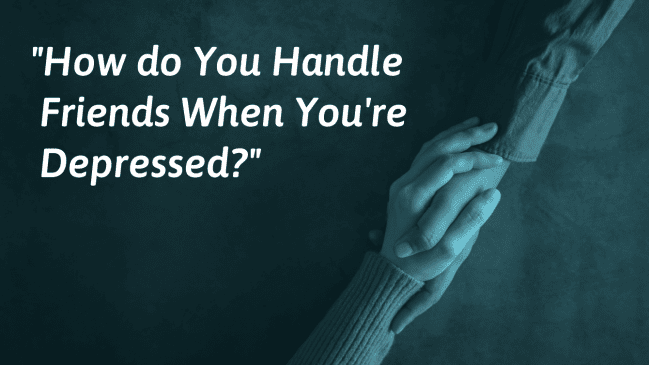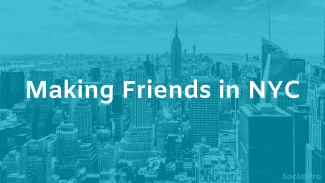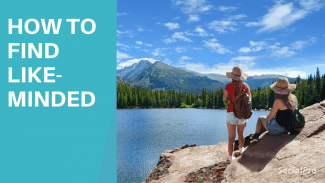“I don’t have any friends, and I’m depressed. I see people laughing with friends or kissing their partners, and I feel so lonely.”
Having depression and no friends often go hand-in-hand in a “chicken or the egg” situation. Loneliness can make us depressed. On the other hand, when we have depression and anxiety, we might isolate ourselves from others, assume that no one can understand us, or believe that we have nothing to offer others. That makes friendships very difficult.
Sections
How to make friends when you’re depressed
1. Identify your roadblocks to making friends
Figuring out the roadblocks to having friends can help you solve the issues. What is getting in the way between you and friendships? Then, work on addressing those issues directly.
Is it that you don’t meet people and start friendships? If you barely leave the house, it will make it challenging to meet new people and make friends. You can develop online connections while gradually increasing your comfort level of doing things outside the house.
Perhaps you meet people but find it difficult to talk to them and become friends. Anxiety can make it difficult to talk to people, especially in the beginning. It might help you to learn how to focus on the present moment and not the negative stories that are racing in your mind.
Or do you find that you can make friends, but those friendships end seemingly for no reason? They might have been toxic friendships, or perhaps there’s another reason for the friendship to have come to an end.
2. Try taking action, even if it feels hard
Start being intentional about making friends. Go out to places where you’re likely to meet people who are also looking to meet new friends. For example, new ex-pats to your city are more likely to want to meet new people than new parents who are busy with work, raising children, and having their own circle of friends. Broaden your mind and be open to talking to people of different ages and backgrounds.
3. Practice interacting with people
Practice making contact with people. First, get comfortable sharing eye contact and smiling at someone. Practice saying hello to people.
If you need help knowing what to talk to people about, try reading our guides: what do people talk about and I can’t talk to people.
4. Extend invitations
As you become familiar with people, initiate conversations. Leave openings for further contact, such as “I have this movie I want to watch. Are you interested?” If someone is talking about something that you find interesting, let them know! You can say something like, “that restaurant you mentioned sounds amazing. Could you send me the name?” Questions like that can be a great opening to exchanging contact information.
5. Be honest
As you get to know your new friends, develop a give-and-take. That includes sharing about the fact that you have depression. It doesn’t have to be a secret, but you don’t have to share everything at once, either.
6. Take it slow
Great friendships can take time to develop, especially when you’re depressed. Don’t expect a friendship to cure or heal your depression or your friend to always be there for you.
7. Continue making healthy choices.
Don’t sacrifice yourself for friendship. That might mean passing out on an invitation to go out when you know you have to wake up early or refuse drinks because you know it makes you feel more depressed. Your recovery should come first.
See our guide on how to become friends with someone.
Places to meet potential friends when you’re depressed
When you have depression and anxiety, meeting people at parties or bars seems like a very daunting prospect. Loud places with large groups of people aren’t appealing. Besides, it’s challenging to get to know people that way.
Here are some alternative methods of meeting people when you’re depressed.
1. Support groups
In-person and online support groups are a great way to meet other people going through similar things. The most significant benefit of meeting friends in this way is that they will understand what you’re going through. Acceptance and understanding are essential foundations in friendships. There’s no need for small talk here. You talk about the important things and get to know people in a profound way.
Livewell is a free online support group specifically for people dealing with depression. CODA (Codependents Anonymous) is a group focused on learning how to have healthy relationships. ACA (Adult Children of Alcoholics and Dysfunctional Homes) is for people who grew up in homes lacking support. Both CODA and ACA have online and physical meetings, based on where you live. You can also ask your doctor or therapist for recommendations on local support groups.
2. Game nights
Board Game nights or even pub quizzes are a great way to meet people. People usually attend these events with a specific goal of meeting new people. People will likely react in a positive way if you ask to join their team or game.
Another bonus with events like board game nights is that you have a high chance of meeting introverts. That means that they might be willing to meet up in the future for other low-key events like watching a movie or having dinner together.
2. Group hikes or walks
A lot of people want to exercise but find it difficult to set up a habit. These people are usually happy to meet other people in the same boat. Check your local Facebook groups and events to see if anyone is setting up group hikes. If you can’t find anything, consider making a post yourself! Post in your local neighborhood/city group. Your post can look something like this:
“Hi, everyone. I’m looking to meet some new people and get in shape, and I thought I would combine the two. I want to walk for an hour twice a week in the X area. Is anyone else interested?”
You might be surprised at the response.
3. Joining a class
Sure, you’re not very likely to meet your next best friend if you go to a yoga class once every few months. But if you become a regular, you will see the same faces over and over. Our friendships usually form with people who we see regularly. As we become familiar with their faces, we start to exchange greetings and, eventually, more in-depth conversations. In Psychology, this tendency to like people we’re similar to and who we feel comfortable with is known as the Proximity Effect.[1] By joining a class, you will meet people who have similar interests as you. By going consistently, you put them in your proximity and become familiar with them.
Consider a class like language, drawing, or martial arts, where you can see your progress. Or consider an eight-week Mindfulness-Based Stress Reduction course, which can decrease symptoms of depression.[2]
4. Volunteering
Volunteering in your community can be a great way to become friends with people you might not otherwise meet. An advantage of meeting people in this way is that it gives you something concrete to talk about and break the ice.
Consider volunteering at an animal shelter, daycare, or nursing home. Some cities have different programs to help homeless people and at-risk youth, such as night patrols or distribution of sandwiches and clean needles. Your area might have beach or park clean-ups.
5. Online
Online communities are a great way to make friends with others who share our interests, even if they’re niche.
For example, Reddit is a great place to meet new friends because many people use the website. You can find “subreddits” for everything from specific TV shows and video games to support subreddits (like r/depression, r/eood, r/depressionrecovery, and r/cptsd).
There are several subreddits dedicated to making friends and meeting new people:
For more tips on meeting friends online, try reading our guide to making friends online.
How to navigate being depressed and having no friends
1. Remind yourself that you are worthy
When we feel that people don’t like us, we might assume something is inherently wrong with us. The truth is that you are not any more or less valuable than anyone else. Depression is difficult to deal with, but it doesn’t change the core of who you are. You’re allowed to make mistakes, be imperfect, and feel bad. You’re still a lovable and valuable person who deserves good things.
2. Try sharing about challenges
There can be a lot of shame in being depressed. Sharing our struggle with mental health can be difficult. The reward is that talking about it can help us understand ourselves better. Besides, believe it or not, talking about your struggles with depression can be a gift to others. It can help them understand things about themselves and their loved ones that they may have not even considered.
3. Do things you enjoy
When we’re depressed, we can quickly get stuck in a rut, especially when we don’t have friends to do things with. We might feel awkward about going out to a restaurant or movie by ourselves. Try to get comfortable with doing different things by yourself. You might think that everyone around you is judging you, but the truth is people are usually concerned about themselves.
Try to schedule a time to do something you don’t normally do, like painting. It can be only for ten minutes. Then, give yourself credit for trying new things.
Get some ideas from our list of fun activities for people with no friends.
4. Take the time to do inner work
While it can seem like depression is caused by having no friends, the truth is more complicated than that. Depression doesn’t just affect our relationships. It affects our thinking patterns, the choices we make for ourselves, and the filters we use to view the world.
There’s no doubt that relationships are important. Yet isolation can sometimes be an opportunity to do deep healing work that we sometimes miss when we are always “doing.”
Try delving into therapy, work through self-help books and workbooks, journal, try alternative healing modalities, and experiment with new ways of expressing yourself (like art journaling, singing, etc.)
How to navigate friendships when you’re depressed
Depression and friendships sometimes seem like oil and water. It can be hard to get them started. In some cases, friendships might seem unbalanced, unstable, or even harmful. It’s important to consider what you can expect from friendships. Here are some things to keep in mind.
1. Friendships can take a while to develop
It’s normal to get excited when we meet someone we like. We might imagine how we become best friends and all the cool things we will do together. Realistically, sometimes we meet someone who is busy and can’t find the time to meet up despite wanting to. Or we don’t see each other regularly enough to get through the “getting to know you” stage.
Be patient and let things develop. If someone says that they are busy the first time you suggest meeting up, don’t assume that it’s a sign they don’t like you. It’s probably not personal.
2. No one can meet all of our emotional needs
Part of friendship is being there for each other and sharing what’s going on for us. When we’re struggling, we might unintentionally take this too far in one direction. Make sure your friendship isn’t one-sided. It’s great to have a friend to take to, but they shouldn’t be the only place you vent.
Therapy, exercise, journaling, meditation, and support groups are other tools you can use for emotional regulation.
Or perhaps you meet someone who is a great listener, but you don’t share many interests. Remember that it’s normal to have different friends for different “needs.” One person might be great for trying new restaurants together but doesn’t like to have intellectual conversations. Let your friendship with each person be its own “entity” and develop naturally. Don’t try to force relationships to be what you think they should be.
3. Learning how to set boundaries
“I’m always there for others, but when it comes down to it, no one is there for me.”
A lot of people with depression feel that they give more than they get. It can take a while until we learn to build healthy, balanced relationships. Part of this process involves learning to set boundaries and not to give more than we can.
When you have depression, we might think that friends will disappear the first time we say “no.” But that isn’t the case. And remember: the friends you want to have in your life are healthy people who will be willing to accept the boundaries you set. Your needs matter just as much as theirs.










though advice is good…’ sigh’ it’s not going to keep everyone going…I think everyone hates me. they are always laughing at me behind my back…and I don’t have many friends [meaning, one friend] but I still like having my friend even If he is the only one I have…I just don’t think anyone wants to be my friend…